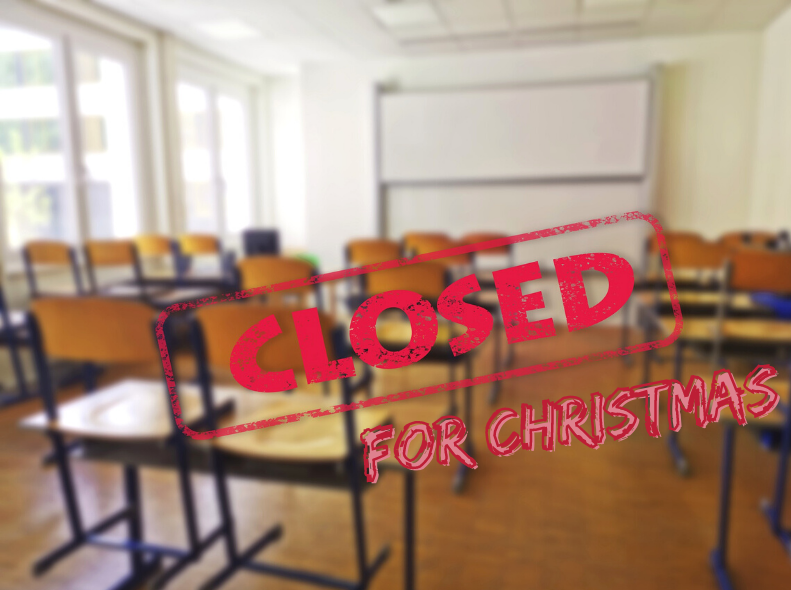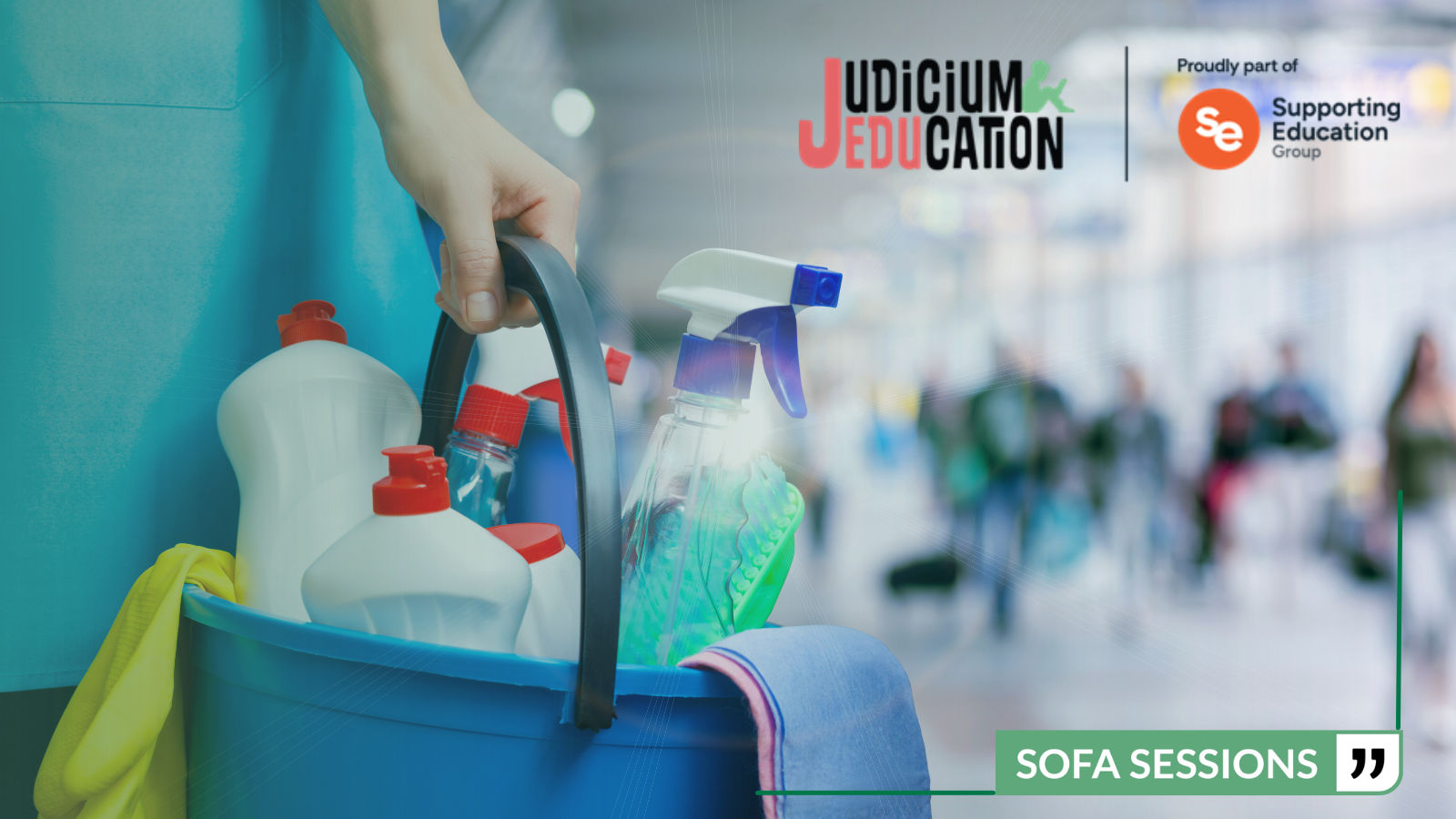Health & Safety: Closing for Christmas – Top H&S Tips to Consider

This session focused on the last week of term wind down, practices to put in place if your building is unoccupied over the break, and any essential maintenance considerations over Christmas.
Tip 1: Sorting Out Classrooms Safely
It’s the time of year when staff may be clearing out the Christmas decorations, storing old materials in stock cupboards and receiving orders for next term. All sorts of weird and wonderful items may appear in your school’s corridors.It’s easy to become complacent with all the hustle and bustle going on as things wind down for the holidays but think about what you are creating. How may it affect the building, and does it meet the H&S policy?
Where are the escape routes in your school? Are they clear? Are there boxes, bags or even Christmas trees obstructing any fire exits? Has furniture been relocated for festivities and it’s now blocking corridors or access? You must ensure you keep your emergency and fire safety plan in place and effective. It’s all about thinking about any changes made and how those can have a knock-on effect to the health and safety on site.
Tip 2: Waste Storage Assessment
Some great questions to ask yourself before closing for Christmas are:
- Where is our waste being stored?
- How is it being stored?
- Who has access to it?
- What waste are we producing?
- How are we dealing with excess waste being produced before the end of term?
- Is there anything unusual or extraordinary? An excellent example is the PTA may have had a clear out and there is a gas bottle from the summer barbeque which is no longer needed. They leave it with the premises manager to sort out. It’s essential to know what items are being attributed to your site’s waste and determining whether it is safe to leave those on site until school reopens. Some items may require specialist disposal so assess your requirements as the week progresses.
Tip 3: Manual Handling and Working at Height – Don’t Rush It!
For example, who is helping to collapse the stage or who is helping to move the piano out of the hall? Are the right people doing the right jobs?
Another pitfall is if staff begin rushing through their to do list to complete all the jobs prior to closing. The last thing anyone wants is an injury just before Christmas, so prioritise the work and designate trained staff to carry it out.
When working at height there is the added element of equipment. Who has permission and access to it and who ensures it is stored properly after use?
Tip 4: Know Who is Accessing your Building/Site over the Holiday
Premises staff:
- Are they alone or working together as a team?
- You need to ensure that your premises staff are looked after and have suitable processes in place with a clear plan of what work will be carried out.
- Their training and risk assessments need to reflect what activities they are planning.
- Key areas to focus on include working at height; working in isolated areas, e.g. plant rooms; or working with chemicals or tools.
Contractors:
- Are they supervised or working without school staff on site?
- We do not recommend contractors work on site without any school staff present. There is a non-transferable responsibility with the school to manage the safety of anyone working on their site and supervision of contractors forms an integral part of meeting this requirement.
- If they are carrying out high risk work, e.g. hot works on a roof, do you have a permit to work system in place that requires additional control measures to be signed off before work starts? Who is returning 30-60 mins after the work is complete to confirm everything is ok?
Non-premises staff:
- Are teaching or support staff in school on their own?
- Identifying which members of staff NEED access to your buildings is key. Every member of staff should be accounted for.
- Determine what work they will be carrying out whilst there to have suitable management arrangements in place. For example:
- If they are working on computers to plan classes in small groups they are self-supporting for low risk work.
- If they are attending the school on their own for extended periods or working to hang a large display that requires a step ladder, they are at higher risk which requires additional control measures.
Tip 5: Essentials to Consider for Lone Work
- Be clear who needs to work alone to ideally remove the need completely or reduce it to as few staff as possible.
- Is your Lone Working risk assessment up to date?
- If there are known risks for the work being carried out or for personal safety, has suitable training been completed?
- How will staff sign in and out of the building and who monitors this?
- Confirm the emergency response in case of a fire or first aid needs.
- If the fire alarm sounds during the holiday period, how will you inform the emergency services that all occupants are accounted for.
- Medical emergencies – how do they call for help if they are incapacitated?
- How will their welfare be checked? (e.g. through telephone calls, texts or emails to confirm they arrive, continue to work and leave the building safely.)
- Intruders – how do staff deal with unauthorised access to the school grounds or building? Do you have a key holder company who can attend with the police or is it members of the management team who will be attending?
Tip 6: Essential Maintenance Considerations Over Christmas
-
Flushing: Do you continue with flushing routines for little used outlets in the holidays?
-
There is a high expectation that sites have Legionella control measures in place. If you do not currently have a flushing routine and one for temperature checks on your hot water and cold-water systems, we recommend looking at the HSE website for the approved code of practice for legionella control which is included in the helpful links below.
-
You must ask yourself how are you making sure your water systems are flushed through, disinfected and safe for reopening?
-
-
Shutting down essential systems:
-
When shutting down these systems, you must already be thinking about the restart after the holidays.
-
Be clear on what those systems need. For instance, if you are shutting down your boilers or setting them to a certain program, ensure the staff member knows how to do it safely and how to restart the system.
-
Most importantly make sure there is cover for that staff member if they are unavailable, and other staff are aware of the procedures and emergency contacts for the system.
-
-
Fire systems:
-
Have a plan in place for how weekly fire alarm, call point and emergency lighting tests continue to maintain the system.
-
-
Waste management and fire loading:
-
How are fire hazards managed?
-
Excess waste produced from end of term clearances needs to be managed.
-
Excessive deliveries of new materials or stores that will arrive before the start of the new term also must be managed.
-
-
Business Continuity Plans for the holiday period:
-
If you have a significant event such as a flood, roof leak, break in, extended loss of power, what is the process for who responds?
-
How do you respond to these situations to ensure the building is safe for the start of term?
-
-
Contractor maintenance visits:
- What work are they carrying out? And who is involved?
- Has contractor vetting been completed?
- What are their emergency procedures should anything go wrong during the holiday shutdown?
Tip 7: Know your Site
It is essential for you to have a good working knowledge of your site and what areas cause potential security risks or personal safety concerns. Address them with risk assessments and devise a plan to minimise any potential threats.
Lastly, Enjoy your Christmas break!
Helpful Links
Judicium Education’s Health and Safety Advisory Service is designed to support schools, firstly, in ensuring a safe working and learning environment, secondly, in complying with the legal requirements imposed on them as employers under the various Health & Safety laws and regulations. For more information, please visit here.
To review Judicium’s forthcoming sofa sessions please click here.
If you require any support in any of these steps, or would like to talk to someone surrounding some support for your school please do not hesitate to call us on 0345 548 7000 or email enquiries@judicium.com.
Related content
.png)
This blog is based on Judicium’s Health and Safety ‘Sofa Session’ from the 7th January 2026, with our resident expert Jamie Ashard CMIOSH. This session focused on Common key stressors in the education sector, Applying the 6 key HSE management standards for stress, Completing a stress risk assessment and implementing practical solutions.
.png)
This blog is based on Judicium’s Health & Safety and SEND session on 26th November with resident expert India Cottenden
.png)
This blog is based on Judicium’s Food Safety Sofa session on 12th November with resident experts Sue Roberts and Tracey Killick

This blog is based on Judicium’s Health and Safety ‘Sofa Session’ on the 15th of October, with our resident expert Mike Wright.

This prestigious award celebrates our commitment to delivering expert, education-specific Health & Safety support that lifts the burden for school teams while raising safety standards across the sector.

This blog is based on Judicium’s Health and Safety ‘Sofa Session’ from 18th June, led by resident expert , Mike Wright, CMIOSH. This session focuses on the control of substances hazardous to health (COSHH) and their relevance in school settings, how assessments should be undertaken and what staff could be at risk.

Sofa Sessions | H&S